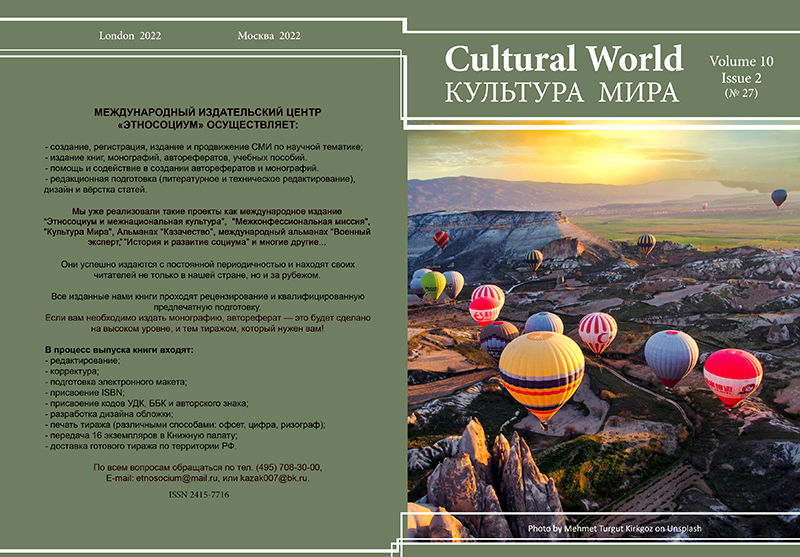
Volume 10. Issue 2. (№ 27)
The Council of Reviewers of the publishing house together with the teaching staff of leading universities:
The main criteria of our choosing materials for publishing is their high scientific level. The main principle of the publishing house is to accept pluralism of views if authors present their points of view in a well-argued manner. The author’s view point does not have to coincide with the editors’ view points.
The authors of submitted materials are responsible for the accuracy of facts, quotations, dates, events, geographical and proper names.
If you use any materials from the journal, you are to give a relevant reference to it.
All the submitted materials are reviewed.
Contents
|
Topical issues of science and culture
|
|
|
Manuilov N.E. Vasily Vereshchagin and Cuba
|
10
|
|
Ryabova E.L., Ternovaya L.O. Comprehending Paris Commune experience in the sphere of education and culture
|
34
|
|
Manuilov N.E. Children of Chernobyl in Cuba
|
47
|
|
Political science
|
|
|
Ryabova E.L., Ternovaya L.O. Sociocultural determinants of Russia’s modern Eurasian turn
|
59
|
|
Shuplenkov N.O. Political culture in the research field
|
72
|
|
Culturology
|
|
| Ryabova E.I., Ternovaya L.O. Conductor is a man of the world and a conductor of the world | 83 |
| Shuplenkov N.O., Ryabova E.L. Clip thinking is a product of digital culture | 96 |
|
Abstracts
|
115
|
|
Authors
|
118
|
Abstracts
Manuilov N.E.
Vasily Vereshchagin and Cuba
On February 17, 2022, the Round Table "Vereshchagin and Cuba" was held at the Central House of Scientists, dedicated to the 180th anniversary of the birth of the great Russian artist Vasily Vasilyevich Vereshchagin and the 120th anniversary of his visit to Cuba.
Key words: Cuba, house of scientists, round table, anniversary, art, artist, Vasily Vasilyevich Vereshchagin.
Ryabova E.L.
Ternovaya L.O.
Comprehending Paris Commune experience in the sphere of education and culture
150 years have passed since a short period when in France, during the Franco-Prussian War, in besieged Paris, its inhabitants tried to implement an incredible social experiment for that time, establishing the Paris Commune. Despite the fact that it lasted only 72 days, its actions affected the fundamental aspects of the social order, including the problems of public education.
Key words: history, education, revolutions, self-government, social experiment.
Manuilov N.E.
Children of Chernobyl in Cuba
On December 22, 2021, in the library of the Central House of Scientists of the Russian Academy of Sciences, as part of the work of the Ecology Section, a video conference was held on the topic “Chernobyl is 35 years old: lessons, experience and public resonance”.
Key words: Cuba, children, Chernobyl, accident, catastrophe.
Ryabova E.L.
Ternovaya L.O.
Sociocultural determinants of Russia's modern Eurasian turn
The article deals with an actual problem, the solution of which in scientific terms requires the involvement of historical, cultural, geopolitical materials, and in practical terms it necessitates an analysis of the socio-economic realities that force modern Russia to make extraordinary efforts to form the space of Greater Eurasia.
Key words: culture, geopolitics, history, civilizational and cultural identity, Eurasianism.
Shuplenkov N.O.
Political culture in the research field
The current state of the international community is characterized by unstable relations between States, political alliances, unions. The condition of relations between states is not only legal norms, but also a system of values aimed at observing the norms of diplomatic, intergovernmental etiquette. Political culture manifests itself in mutual respect for rights, compliance with the norms of political tact. Being essentially an axiological category, political culture includes diplomatic experience, international status, the quality of political intuition and erudition, patterns of behavior and functioning of political subjects, image and style of behavior.
Key words: geopolitics, geopolitical code, political culture, political experience, subject of politics.
Ryabova E.I.
Ternovaya L.O.
Conductor is a man of the world and a conductor of the world
The article deals with the social role of the conductor of a symphony orchestra, which has absorbed the meanings of not only leading a creative team of musicians and conveying the feelings and thoughts of the composer to the public, but creating a certain mood of harmony in the interaction of people, their ability to realize both triumph and the tragedy of the moment. In the article, the ability of conductors, who are often citizens of the world, to be also persons capable of awakening in people the desire to maintain peace, is shown by the example of Wilhelm Furtwängler, Mstislav Rostropovich, Daniel Barenboim and Valery Gergiev.
Key words: culture, art, music, orchestra, conductor, citizenship.
Shuplenkov N.O.
Ryabova E.L.
Clip thinking is a product of digital culture
Digitalization of thinking is relevant in the conditions of globalization of the modern world, because all areas of human life are associated with the technical processing of information, which is spreading rapidly. The processes of digitalization and informatization force us to take a fresh look at the social mode of cultural identity, which some researchers call a digital society. The presence of a wide choice of digital technologies presupposes the development of a special type of thinking that can instantly analyze incoming information, deduce the necessary algorithms of actions, and predict further actions to work with the information received. Discreteness or mosaic perception of information leads to the emergence of the so-called clip thinking.
Key words: globalization, information, clip thinking, user, digital technologies, digitalization of thinking.
Authors
Manuilov N.E., Vice president. Russian Society for Friendship with Cuba.
Ryabova E.I., 2nd Class Lawyer, Candidate of Political Sciences, journal "Cultural World".
Ryabova E.L., Doctor of Political Sciences, Editor-in-chief of the journal "Cultural World".
Shuplenkov N.O., Associate Professor of the Department of history, law and social Sciences of the Stavropol state pedagogical Institute.
Ternovaya L.O., Doctor of Historical Sciences, Professor. Moscow Automobile and Highway State Technical University.

